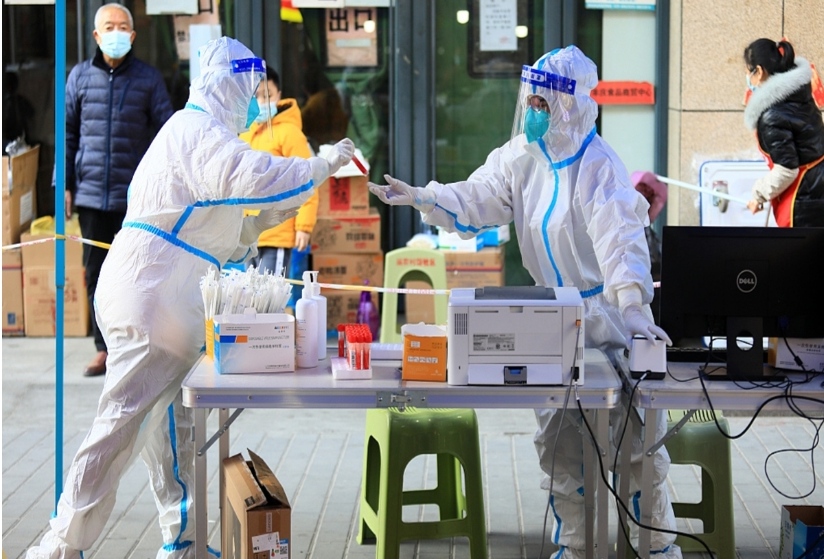Xi’an indicates light of hope amid terrible lockdown

Medical staff conduct nucleic acid tests in a community in Xi’an, Shaanxi Province on December 21, 2021.
Xi’an, capital city of Northwest China’s Shaanxi Province which was hit hard by a COVID-19 epidemic flare-up in the past weeks, saw a dim light of hope against a uphill battle to tackle the resurgence as it reported some drop in mass infections on Wednesday, from the previous day’s cases.
All the new cases were mainly detected among people in quarantine or sealed-off areas, which is a signal of community transmission being controlled.
If the trend continues for a couple of more days without cases rebounding, the conclusion can be made that the previous control measures have worked, saud Wang Guangfa, a respiratory expert at Peking University First Hospital.
Wang said the lifting of the lockdown should be carried out in a “precise” manner – normalcy should be restored to communities that have reported zero cases or have passed a certain quarantine period without new cases.
Controls could last longer for communities that are reporting rapid spread of new cases, the expert said, noting that ultimately, the epidemic controls should balance results and social costs.
During the early days after a sudden lockdown on December 23 and upgraded controls on December 27, news about total chaos have also emerged, and prompted reflection on whether the measures can be implemented better.
Local people shared a consensus that Xi’an never lacked supplies, but the sudden and complete lockdown halted the logistics system that the mega-city relies on while governments and communities lacked enough hands for the “last mile.”
Difficulties in buying fresh food were common for quite some time, and there was total panic. Communities were largely sustained via a very few community workers and volunteers before the government’s free vegetable packages arrived in most places.
The situation has stabilized, as vegetables are being delivered routinely, and the channels for people with medical or other urgent needs have been streamlined.
Xi’an experienced a sudden lack of deliveries after the lockdown. The situation eased after sometime but became difficult again after the upgraded controls. People turned to primitive bartering, and logistics became stable around the New Year’s Day.
After the lockdown, many residents were quickly mobilized to join the volunteer teams, delivering food for neighbors and helping organize massive nucleic acid testing.
There were voices questioning whether such a lockdown is necessary, but living next to a “village in the city,” those “villages,” which are crowded with highly mobile groups of people, posed a great challenge to curbing community transmission, and the strict measures aimed to protect the public.
The situation in Xi’an had turned the city into a humanitarian crisis. Xi’an is now figuring out a way, and the virus is now different from what it was in Wuhan. It is unfair to negate the city’s efforts and achievements because of some problems.
Xi’an also released notices, requiring districts to guarantee the needs of people with urgent medical conditions, chronic diseases requiring routine treatment and expectant mothers, a lesson learned from Wuhan.
But there were cases of rigid implementation, like the beating of a starving young man who violated rules to buy steamed buns, and miscarriages caused by unsmooth channels to hospitals.
For a big city like Xi’an, policies are brought down to earth by numerous basic-level personnel. It is important to enhance their capabilities and sense of responsibility, observers said.
People have stories of how they stored food, neighbors exchanged food and helped each other, and the more difficult situations that migrant workers and stranded visitors faced. Xi’an residents experienced great hardships.
For Xi’an, the lockdown Has inevitably created problems and difficulties, but now public complaints and critiques are driving local authorities to improve governance.
Some analysts noted that those critical voices, and online attention to several really bad examples of rigid implementation of epidemic controls, reflected that the internet is an important and effective platform for public opinion to be expressed, and for supervision and government response in China.
Omicron variant is raging in many parts of the world in pace with the holidays. The US hit 1 million daily cases on Monday and several European countries have also had record numbers recently.



